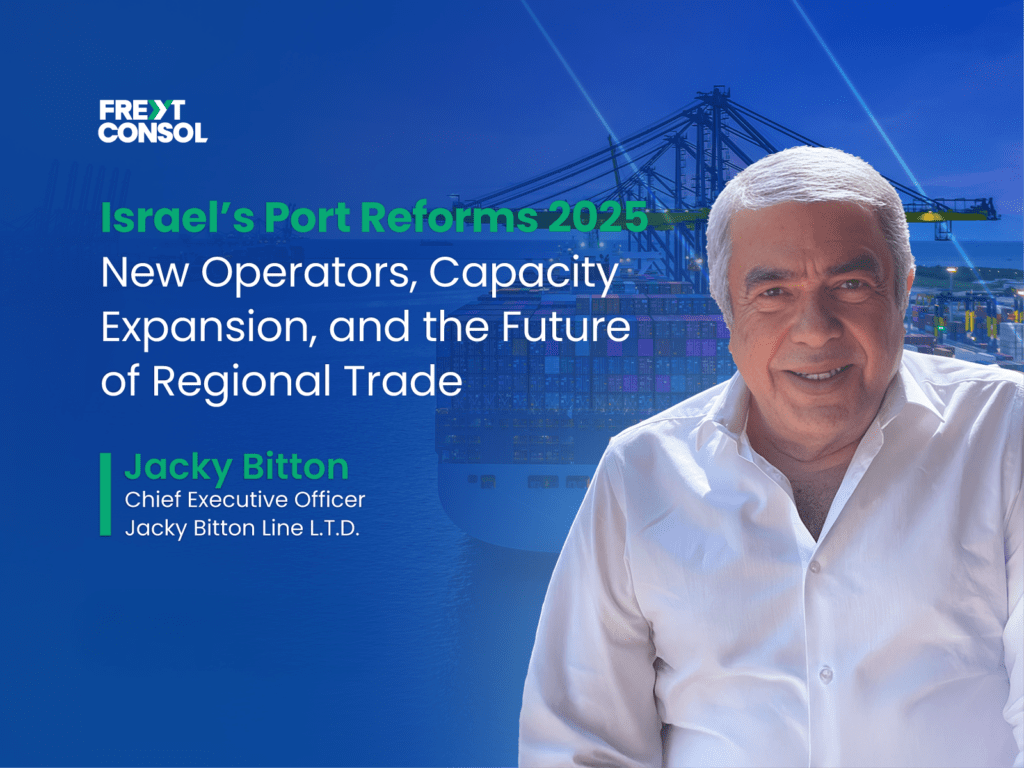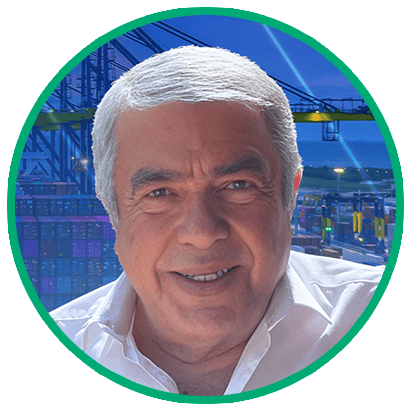09 Jun 2025
Israel’s Port Reforms 2025: New Operators, Capacity Expansion, and the Future of Regional Trade
By Jacky Bitton, CEO of Jacky Bitton Line L.T.D. LCL Neutral NVOC Israel – 48 years in LCL consolidation

Israel’s port sector is undergoing a transformation that is reshaping not only how goods move across its docks, but how the country positions itself within global trade. Regulatory reforms, new private operators, and large-scale infrastructure projects are steadily replacing outdated models with faster, more competitive systems. This is not change for its own sake; it is a necessary response to shifting global logistics patterns, rising cargo volumes, and the need to compete with larger, better-connected ports in the region.
Privatization and New Operators
By early 2025, Israel had completed the privatization of Haifa Port, selling a 70% stake to India's Adani Ports and SEZ Ltd., alongside Israel's Gadot Group. This move effectively introduced international management practices to one of Israel's most strategic assets. Concurrently, Shanghai International Port Group (SIPG) now operates the new Bay Port in Haifa, while Terminal Investment Limited (TiL), a Swiss company affiliated with MSC, manages operations at Ashdod's South Port. These developments signal a decisive shift towards foreign-operated terminals, designed to introduce competition, drive down costs, and improve efficiency.
Capacity Expansion and Throughput Growth
The immediate impact is already visible. In 2023, Bay Port processed approximately 830,000 TEUs, surpassing the older Haifa Port's throughput for the first time. Meanwhile, Ashdod’s South Port, with Berth 28 now operational under new management, is steadily gaining market share. According to data from Israel's Ministry of Transport and Road Safety, container handling across all Israeli ports is projected to grow from 2.8 million TEUs in 2023 to approximately 4.9 million TEUs by 2035.
Port-Specific Developments: Ashdod and Haifa
Ashdod Port: Innovation and Infrastructure
Ashdod Port has invested over 1 billion shekels into upgrading Platform 21, allowing it to handle megaships up to 400 meters in length and 18,000 TEU capacity. The eastern side of the platform now reaches a depth of 17.5 meters, supporting 130-ton cranes, while the western side, at 16 meters, supports large grain vessels.
Ashdod is also investing in innovation, hosting 22 startups through a dedicated technological incubator focused on logistics, energy, security, and cyber solutions. The port has launched a venture capital fund to back these startups and provide infrastructure for real-world pilot programs.
In April 2024, Ashdod Port was designated as a temporary hub for humanitarian shipments to Gaza, reinforcing its strategic role in the region.
Haifa Port: Privatization, Cruise Growth, and Urban Development
Since the 2023 privatization, Haifa Port has improved its operational performance. Container dwell times have been halved, from 44 hours in 2021 to 22 hours in early 2023. Waiting times have dropped from 7.2 to 4.5 hours, and average handling productivity rose to 49.7 containers per hour.
Haifa has also become a growing hub for the cruise industry, with major lines such as MSC and Norwegian Cruise Line adding the port to their itineraries, boosting local tourism and economic activity.
In April 2024, the Israel Land Authority approved a redevelopment plan for 2.3 hectares near the port, including 500 new housing units and commercial spaces—an initiative designed to integrate the port more closely with the city and stimulate urban renewal.
Regulatory Reforms for Operational Efficiency
Capacity upgrades are only part of the solution. In March 2025, the government implemented new regulations to support operational efficiency: streamlining permits, expanding private operators’ rights, and incentivizing faster turnaround. The goal is to significantly reduce historically high dwell times and improve Israel’s competitiveness.
Rail Connectivity and Inland Transport
Haifa’s Bay Port was linked to the national railway in 2024, providing direct inland container transport and reducing overland transit times by up to 20%. Improved inland infrastructure is becoming critical to ensure port-side gains are not lost further along the supply chain.
Opportunities and Risks
Increased competition among port operators promises greater service flexibility and potentially lower costs. But global operators bring higher expectations and more complex protocols that local players must adapt to quickly.
Key Factors to Monitor
- • Pricing Dynamics: While competition could lower fees, the current trend is toward service differentiation rather than immediate price cuts.
- • Service Standards: Foreign operators are introducing stricter performance metrics and documentation protocols.
- • Berth Access: Regulators must ensure equitable berth access, preventing favoritism toward affiliated carriers.
- • Operational Flexibility: Enhanced inland transport and multi-port coordination between Haifa and Ashdod will become essential.
Regional Trade Expansion
The Abraham Accords have opened new corridors to Gulf States, positioning Israel as a central logistics hub for Europe–Asia–Middle East trade. The ongoing upgrades are critical to seizing this opportunity.
Forecasts and Projections
Bay Port could exceed 1.2 million TEUs annually by 2030. Ashdod's continued expansion could add 700,000 TEUs of capacity within five years. These forecasts align with OECD projections of sustained growth in Eastern Mediterranean trade.
Key concerns include labor relations, cybersecurity, and environmental impact. Recent cyber incidents and climate targets (IMO 2050) require investments in digital and green technologies.
From upgraded infrastructure to foreign investment and smarter logistics, Israel’s port transformation is far-reaching. With its strategic location and enhanced capabilities, Israel is becoming more than a link in the chain—it’s positioning itself as a regional logistics hub. For those in the industry, the challenge is clear: stay informed, stay flexible, and stay ready.

Freyt Consol Blog Contributor
Freyt Consol is a global network for LCL consolidators and NVOCCs dedicated to excellence and long-term growth. We create an environment where members thrive by collaborating with trusted partners and accessing essential resources.




